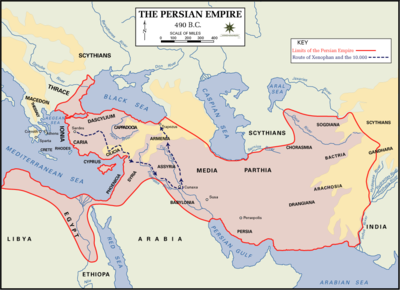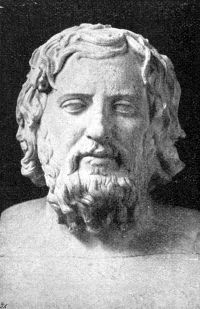- Xenophon
-
This article is about the ancient Greek writer Xenophon. For other people named Xenophon, see Xenophon (disambiguation).
Xenophon (Ancient Greek Ξενοφῶν, Xenophōn; c. 430 – 354 BC), son of Gryllus, of the deme Erchia of Athens, also known as Xenophon of Athens, was a Greek historian, soldier, mercenary, philosopher and a contemporary and admirer of Socrates. He is known for his writings on the history of his own times, the 4th century BC, preserving the sayings of Socrates, and descriptions of life in ancient Greece and the Persian Empire.
Contents
Life and writings
Early years
Xenophon's birth date is uncertain, but most scholars agree that he was born around 431 BC near the city of Athens.[1] Xenophon was born into the ranks of the upper classes, thus granting him access to certain privileges of the aristocracy of ancient Attica. While a young man, Xenophon participated in the expedition led by Cyrus the Younger against his older brother, king Artaxerxes II of Persia, in 401 BC. Xenophon writes that he had asked the veteran Socrates for advice on whether to go with Cyrus, and that Socrates referred him to the divinely inspired Delphic oracle. Xenophon's query to the oracle, however, was not whether or not to accept Cyrus' invitation, but "to which of the gods he must pray and do sacrifice, so that he might best accomplish his intended journey and return in safety, with good fortune". The oracle answered his question and told him to which gods to pray and sacrifice. When Xenophon returned to Athens and told Socrates of the oracle's advice, Socrates chastised him for asking so disingenuous a question.
 Route of Xenophon and the Ten Thousand
Route of Xenophon and the Ten Thousand
Under the pretext of fighting Tissaphernes, the Persian satrap of Ionia, Cyrus assembled a massive army composed of native Persian soldiers, but also a large number of Greeks. Prior to waging war against Artaxerxes, his brother, Cyrus proposed that the enemy was the Pisidians, and so the Greeks were unaware that they were to battle against the larger army of King Artaxerxes II. At Tarsus the soldiers became aware of Cyrus's plans to depose the king, and, as a result, refused to continue. However, Clearchus, a Spartan general, convinced the Greeks to continue with the expedition. The army of Cyrus met the army of Artaxerxes II in the Battle of Cunaxa. Despite effective fighting by the Greeks, Cyrus was killed in the battle. Shortly thereafter, Clearchus was invited to a peace conference, where, alongside four other generals and many captains, he was betrayed and executed. The mercenaries, known as the Ten Thousand, found themselves without leadership far from the sea, deep in hostile territory near the heart of Mesopotamia. They elected new leaders, including Xenophon himself, and fought their way north through hostile Persians and Medes to Trapezus on the coast of the Black Sea. They then made their way westward back to Greece. Once there, they helped Seuthes II make himself king of Thrace, before being recruited into the army of the Spartan general Thibron.
Xenophon's book Anabasis ("The Expedition" or "The March Up Country") is his record of the entire expedition against the Persians and the journey home. The Anabasis was used as a field guide by Alexander the Great during the early phases of his expedition into Persia.
Exile and death
Xenophon was later exiled from Athens, most likely because he fought under the Spartan king Agesilaus II against Athens at Coronea. However, there may have been contributory causes, such as his support for Socrates, as well as the fact that he had taken service with the Persians. The Spartans gave him property at Scillus, near Olympia in Elis, where he composed the Anabasis. However, because his son Gryllus fought and died for Athens at the Battle of Mantinea while Xenophon was still alive, Xenophon's banishment may have been revoked. Xenophon died in either Corinth or Athens. His date of death is uncertain; historians only know that he survived his patron Agesilaus II, for whom he wrote an encomium. Xenophon had a fond love of Athens but didn't believe in its political morals, which leads some to believe that he was an oligarch.
Legacy
Diogenes Laertius states that Xenophon was sometimes known as the "Attic Muse" for the sweetness of his diction; very few poets wrote in the Attic dialect. Xenophon is often cited as being the original "horse whisperer", having advocated sympathetic horsemanship in his "On Horsemanship".
Xenophon's standing as a political philosopher has been defended in recent times by Leo Strauss, who devoted a considerable part of his philosophic analysis to the works of Xenophon, returning to the high judgment of Xenophon as a thinker expressed by Shaftesbury, Winckelmann, Machiavelli, and John Adams.
Ponting cites Xenophon as one of the first thinkers to argue that the ordered world must have been conceived by a god or gods.[2] Xenophon's Memorabilia poses the argument that all animals are "only produced and nourished for the sake of humans".[2] Though he spent much of his life in Athens, Xenophon's involvement in Spartan politics (he was a close associate of King Agesilaus II) has led to him being closely associated with the city.
List of works
Xenophon's writings, especially the Anabasis, are often read by beginning students of the Greek language. His Hellenica is a major primary source for events in Greece from 411 to 362 BC, and is considered to be the continuation of the History of the Peloponnesian War by Thucydides, going so far as to begin with the phrase "Following these events...". The Hellenica recounts the last seven years of the Peloponnesian war, as well as its aftermath. His Socratic writings, preserved complete, along with the dialogues of Plato, are the only surviving representatives of the genre of Sokratikoi logoi.
Historical and biographical works
- Anabasis (also: The Persian Expedition or The March Up Country or The Expedition of Cyrus)
- Cyropaedia (also: The Education of Cyrus)
- Hellenica
- Agesilaus
Socratic works and dialogues
Short treatises
- On Horsemanship
- The Cavalry General
- Hunting with Dogs
- Ways and Means
- Constitution of Sparta
In addition, a short treatise on the Constitution of Athens exists that was once thought to be by Xenophon, but which was probably written when Xenophon was about five years old. This is found in manuscripts among the short works of Xenophon, as though he had written it also. The author, often called in English the "Old Oligarch", detests the democracy of Athens and the poorer classes, but he argues that the Periclean institutions are well designed for their deplorable purposes. Leo Strauss has argued that this work is in fact by Xenophon, whose ironic posing he believes has been utterly missed by contemporary scholarship.
Notes
- ^ "Xenophon". Encyclopædia Britannica. http://www.britannica.com/EBchecked/topic/650658/Xenophon. Retrieved 21 September 2009.
- ^ a b Ponting, C. A Green History of the World: The Environment and the Collapse of Great Civilisations p. 142, Penguin: New York
References and further reading
- Bradley, Patrick J. "Irony and the Narrator in Xenophon's Anabasis", in Xenophon. Ed. Vivienne J. Gray. Oxford University Press, 2010 (ISBN13: 978-0-19-921618-5; ISBN10: 0-19-921618-5).
- Anderson, J.K. Xenophon. London: Duckworth, 2001 (paperback, ISBN 1-85399-619-X).
- Xénophon et Socrate: actes du colloque d'Aix-en-Provence (6-9 novembre 2003). Ed. par Narcy, Michel and Alonso Tordesillas. Paris: J. Vrin, 2008. 322 p. Bibliothèque d'histoire de la philosophie. Nouvelle série, ISBN 978-2-7116-1987-0.
- Dillery, John. Xenophon and the History of His Times. London; New York: Routledge, 1995 (hardcover, ISBN 0-415-09139-X).
- Evans, R.L.S. "Xenophon" in The Dictionary of Literary Biography: Greek Writers. Ed.Ward Briggs. Vol. 176, 1997.
- Gray, V.J. "The Years 375 to 371 BC: A Case Study in the Reliability of Diodorus Siculus and Xenophon, The Classical Quarterly, Vol. 30, No. 2. (1980), pp. 306–326.
- Higgins, William Edward. Xenophon the Athenian: The Problem of the Individual and the Society of the "Polis". Albany: State University of New York Press, 1977 (hardcover, ISBN 0-87395-369-X).
- Hirsch, Steven W. The Friendship of the Barbarians: Xenophon and the Persian Empire. Hanover; London: University Press of New England, 1985 (hardcover, ISBN 0-87451-322-7).
- Hutchinson, Godfrey. Xenophon and the Art of Command. London: Greenhill Books, 2000 (hardcover, ISBN 1-85367-417-6).
- The Long March: Xenophon and the Ten Thousand, edited by Robin Lane Fox. New Heaven, Connecticut; London: Yale University Press, 2004 (hardcover, ISBN 0-300-10403-0).
- Kierkegaard, Søren A. The Concept of Irony with Continual Reference to Socrates. Princeton: Princeton University Press, 1992 (ISBN 978-069-102072-3)
- Moles, J.L. "Xenophon and Callicratidas", The Journal of Hellenic Studies, Vol. 114. (1994), pp. 70–84.
- Nadon, Christopher. Xenophon's Prince: Republic and Empire in the "Cyropaedia". Berkeley; Los Angeles; London: University of California Press, 2001 (hardcover, ISBN 0-520-22404-3).
- Nussbaum, G.B. The Ten Thousand: A Study in Social Organization and Action in Xenophon's "Anabasis". (Social and Economic Commentaries on Classical Texts; 4). Leiden: E.J. Brill, 1967.
- Phillips, A.A & Willcock M.M. Xenophon & Arrian On Hunting With Hounds, contains Cynegeticus original texts, translations & commentary. Warminster: Aris & Phillips Ltd., 1999 (paperback ISBN 0-85668-706-5).
- Rahn, Peter J. "Xenophon's Developing Historiography", Transactions and Proceedings of the American Philological Association, Vol. 102. (1971), pp. 497–508.
- Rood, Tim. The Sea! The Sea!: The Shout of the Ten Thousand in the Modern Imagination. London: Duckworth Publishing, 2004 (paperback, ISBN 0-7156-3308-2); Woodstock, New York; New York: The Overlook Press, (hardcover, ISBN 1-58567-664-0); 2006 (paperback, ISBN 1-58567-824-4).
- Strauss, Leo. Xenophon's Socrates. Ithaca, New York; London: Cornell University Press, 1972 (hardcover, ISBN 0-8014-0712-5); South Bend, Indiana: St. Augustines Press, 2004 (paperback, ISBN 1-58731-966-7).
- Stronk, J.P. The Ten Thousand in Thrace: An Archaeological and Historical Commenary on Xenophon's Anabasis, Books VI, iii–vi – VIII (Amsterdam Classical Monographs; 2). Amsterdam: J.C. Gieben, 1995 (hardcover, ISBN 90-5063-396-X).
- Usher, S. "Xenophon, Critias and Theramenes", The Journal of Hellenic Studies, Vol. 88. (1968), pp. 128–135.
- Waterfield, Robin. Xenophon's Retreat: Greece, Persia and the End of the Golden Age. Cambridge, Massachusetts: The Belknap Press of Harvard University Press, 2006 (hardcover, ISBN 0-674-02356-0); London: Faber and Faber, 2006 (hardcover, ISBN 978-0-571-22383-1).
- Xenophon, Cyropaedia, translated by Walter Miller. Harvard University Press, 1914, ISBN 978-0-674-99057-9, ISBN 0-674-99057-9 (books 1-5) and ISBN 978-0-674-99058-6, ISBN 0-674-99058-7 (books 5-8).
External links
- Xenophon entry in the Internet Encyclopedia of Philosophy
 Diogenes Laërtius, Life of Xenophon, translated by Robert Drew Hicks (1925).
Diogenes Laërtius, Life of Xenophon, translated by Robert Drew Hicks (1925).- Graham Oliver's Xenophon Homepage
- Xenophon's Education of Cyrus (Cyropaedia) Web directory
- Xenophon's Works at The University of Adelaide
- Famous Quotes by Xenophon
- Sanders (1903) Ph D Thesis on The Cynegeticus
- Xenophon on Lycurgus.org all about Xenophon.
Project Gutenberg e-texts
Categories:- 431 BC births
- 355 BC deaths
- 4th-century BC Greek people
- 4th-century BC historians
- 4th-century BC writers
- Ancient Athenian generals
- Ancient Athenian historians
- Ancient Greek mercenaries
- Ancient Greek military writers
- Attic Greek writers
- Classical era Greek historians
- Greco-Persian Wars
- Ostracized Athenians
- Pupils of Socrates
- Classical horsemanship
- Ancient Athenians
Wikimedia Foundation. 2010.

